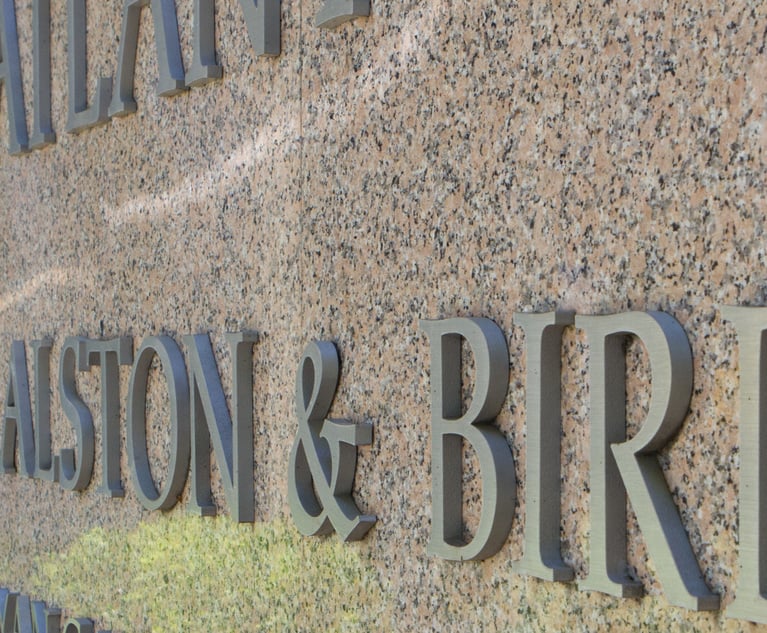 Judge Kevin Newsom, U.S. Court of Appeals for the Eleventh Circuit, Atlanta. (Photo: Alison Church/Freelance)
Judge Kevin Newsom, U.S. Court of Appeals for the Eleventh Circuit, Atlanta. (Photo: Alison Church/Freelance)Split 11th Circuit Settles 'Political Tug-of-War' in Minimum Wage Case
Barbara Jane Chisholm of Altshuler Berzon in San Francisco, who represents the workers and the civil rights groups, said the ruling "will effectively impede vindication of important constitutional rights."
December 13, 2019 at 06:06 PM
5 minute read
A fractured U.S. Court of Appeals for the Eleventh Circuit on Friday quashed the appeal of Alabama workers and civil rights groups seeking a higher minimum wage.
After hearing the case en banc in June, the court split 7-5 against organizations seeking to uphold the city of Birmingham's effort to increase hourly pay. The opinion included 83 pages, two dissents and one special concurrence taking the dissenters to task.
Judge Kevin Newsom wrote for the majority and told the story.
"This case arises out of a political tug-of-war between the State of Alabama and the City of Birmingham over economic policy—in particular, over minimum wage rates," Newsom said. "In 2015, the Birmingham City Council petitioned the Alabama Legislature to raise the minimum wage, statewide, above the $7.25 federal baseline. When the Legislature declined—and following some back-and-forth with state officials—the City took matters into its own hands, eventually adopting a local ordinance that immediately increased the minimum wage within Birmingham's city limits by 39%, to $10.10. The Legislature responded by enacting a statute that aimed to standardize wage policy throughout the state by prohibiting and 'void[ing]' any local law that required employers, among other things, to pay wages higher than state or federal law mandates. That statute—Act No. 2016-18—had the effect of nullifying Birmingham's minimum-wage ordinance."
Two African American fast food employees, Marnika Lewis and Antonin Adams, along with Greater Birmingham Ministries and the NAACP of Alabama, sued the state, the governor, the attorney general and the mayor of Birmingham.
Friday's opinion denies their effort to reverse a district court's grant of summary judgment in the state's favor.
Newsom suggested that workers should have sued their employers to pay the higher rate, not the state.
"That choice presents us with an important threshold question: Do the employees have Article III standing to sue the Attorney General?" Newsom asked in the majority opinion. "We hold that they do not—in particular, because they cannot demonstrate either (1) that their alleged injuries are fairly traceable to his conduct or (2) that those injuries would be redressed by the declaratory and injunctive relief they have requested. Because we conclude that the employees lack standing to sue, we need not (and indeed cannot) consider the merits of their equal-protection claim."
Asked for comment Friday, the offices of Attorney General Steve Marshall and Gov. Kay Ivey did not have an immediate response.
Barbara Jane Chisholm of Altshuler Berzon in San Francisco, who represents the workers and the civil rights groups, said the ruling "will effectively impede vindication of important constitutional rights."
"Obviously, we are disappointed in the decision and are concerned that the effect of this decision is to prevent voters from litigating claims of race discrimination against the state of Alabama," she said.
Newsom was joined by Chief Circuit Judge Ed Carnes and Judges William Pryor, Elizabeth Branch, Britt Grant, Gerald Tjoflat and Stanley Marcus.
"Bottom line: Plaintiffs cannot demonstrate that the relief that they seek would—either directly or indirectly—'significantly increase … the likelihood' that their employers would pay them the $10.10 wage prescribed by the Birmingham ordinance," Newsom said. " To the contrary, we think it would be impermissibly 'speculative' to conclude that their requested relief would produce that result."
Judge Charles Wilson wrote a dissent, joined by Judges Beverly Martin, Adalberto Jordan, Robin Rosenbaum and Jill Pryor.
"The majority deprives these plaintiffs of their day in federal court by chalking this up as simply a case of 'wrong defendant'," Wilson said. "What is wrong is that the majority stiffens the requirements for standing on a facial attack at the motion to dismiss phase, avoiding reaching the merits. Neither our Constitution nor the Supreme Court requires as onerous a standard as the majority applies at this stage in the proceedings."
Jordan wrote a separate dissent, joined by the same five names on the Wilson dissent.
"The majority has phrased, and answered, too narrow a question on standing. As a result, it has reached an incorrect and incomplete answer," Jordan said. "But Ms. Lewis and Mr. Adams are not just claiming entitlement to a higher hourly wage. They are also alleging the denial of equal treatment under the law. When their injuries are properly characterized, everything changes."
Judge William Pryor, in addition to joining the majority, wrote a concurring opinion saying the workers have been injured by their employers, not by the state.
"I join the majority's opinion in full. I write separately—and with some authority—to respond to the assertion in Judge Wilson's dissent that 'the Attorney General can act as a sword to enforce the Minimum Wage Act' and so may be the cause of Marnika Lewis's and Antoin Adams's injuries," said Pryor, who was Alabama's attorney general between 1997 and 2004.
"Judge Wilson's dissent rests on a fundamental misunderstanding about Alabama law," Judge William Pryor wrote. "Although the Attorney General of Alabama has broad authority to bring civil actions 'necessary to protect the rights and interests of the state,' Ala. Code § 36-15-12, the Minimum Wage Act is not the kind of law the Attorney General can 'enforce' against a municipality or anyone else for that matter. So the alleged prospect of enforcement by the Attorney General cannot be the cause of Lewis's and Adams's injuries for purposes of standing under Article III. U.S. Const. art. III."
The case is Lewis v. Governor of Alabama, No. 17-11009.
This content has been archived. It is available through our partners, LexisNexis® and Bloomberg Law.
To view this content, please continue to their sites.
Not a Lexis Subscriber?
Subscribe Now
Not a Bloomberg Law Subscriber?
Subscribe Now
NOT FOR REPRINT
© 2024 ALM Global, LLC, All Rights Reserved. Request academic re-use from www.copyright.com. All other uses, submit a request to [email protected]. For more information visit Asset & Logo Licensing.
You Might Like
View All


Insurer Not Required to Cover $29M Wrongful Death Judgment, Appeals Court Rules

After 2024's Regulatory Tsunami, Financial Services Firms Hope Storm Clouds Break
Law Firms Mentioned
Trending Stories
- 1'Largest Retail Data Breach in History'? Hot Topic and Affiliated Brands Sued for Alleged Failure to Prevent Data Breach Linked to Snowflake Software
- 2Former President of New York State Bar, and the New York Bar Foundation, Dies As He Entered 70th Year as Attorney
- 3Legal Advocates in Uproar Upon Release of Footage Showing CO's Beat Black Inmate Before His Death
- 4Longtime Baker & Hostetler Partner, Former White House Counsel David Rivkin Dies at 68
- 5Court System Seeks Public Comment on E-Filing for Annual Report
Who Got The Work
Michael G. Bongiorno, Andrew Scott Dulberg and Elizabeth E. Driscoll from Wilmer Cutler Pickering Hale and Dorr have stepped in to represent Symbotic Inc., an A.I.-enabled technology platform that focuses on increasing supply chain efficiency, and other defendants in a pending shareholder derivative lawsuit. The case, filed Oct. 2 in Massachusetts District Court by the Brown Law Firm on behalf of Stephen Austen, accuses certain officers and directors of misleading investors in regard to Symbotic's potential for margin growth by failing to disclose that the company was not equipped to timely deploy its systems or manage expenses through project delays. The case, assigned to U.S. District Judge Nathaniel M. Gorton, is 1:24-cv-12522, Austen v. Cohen et al.
Who Got The Work
Edmund Polubinski and Marie Killmond of Davis Polk & Wardwell have entered appearances for data platform software development company MongoDB and other defendants in a pending shareholder derivative lawsuit. The action, filed Oct. 7 in New York Southern District Court by the Brown Law Firm, accuses the company's directors and/or officers of falsely expressing confidence in the company’s restructuring of its sales incentive plan and downplaying the severity of decreases in its upfront commitments. The case is 1:24-cv-07594, Roy v. Ittycheria et al.
Who Got The Work
Amy O. Bruchs and Kurt F. Ellison of Michael Best & Friedrich have entered appearances for Epic Systems Corp. in a pending employment discrimination lawsuit. The suit was filed Sept. 7 in Wisconsin Western District Court by Levine Eisberner LLC and Siri & Glimstad on behalf of a project manager who claims that he was wrongfully terminated after applying for a religious exemption to the defendant's COVID-19 vaccine mandate. The case, assigned to U.S. Magistrate Judge Anita Marie Boor, is 3:24-cv-00630, Secker, Nathan v. Epic Systems Corporation.
Who Got The Work
David X. Sullivan, Thomas J. Finn and Gregory A. Hall from McCarter & English have entered appearances for Sunrun Installation Services in a pending civil rights lawsuit. The complaint was filed Sept. 4 in Connecticut District Court by attorney Robert M. Berke on behalf of former employee George Edward Steins, who was arrested and charged with employing an unregistered home improvement salesperson. The complaint alleges that had Sunrun informed the Connecticut Department of Consumer Protection that the plaintiff's employment had ended in 2017 and that he no longer held Sunrun's home improvement contractor license, he would not have been hit with charges, which were dismissed in May 2024. The case, assigned to U.S. District Judge Jeffrey A. Meyer, is 3:24-cv-01423, Steins v. Sunrun, Inc. et al.
Who Got The Work
Greenberg Traurig shareholder Joshua L. Raskin has entered an appearance for boohoo.com UK Ltd. in a pending patent infringement lawsuit. The suit, filed Sept. 3 in Texas Eastern District Court by Rozier Hardt McDonough on behalf of Alto Dynamics, asserts five patents related to an online shopping platform. The case, assigned to U.S. District Judge Rodney Gilstrap, is 2:24-cv-00719, Alto Dynamics, LLC v. boohoo.com UK Limited.
Featured Firms
Law Offices of Gary Martin Hays & Associates, P.C.
(470) 294-1674
Law Offices of Mark E. Salomone
(857) 444-6468
Smith & Hassler
(713) 739-1250






